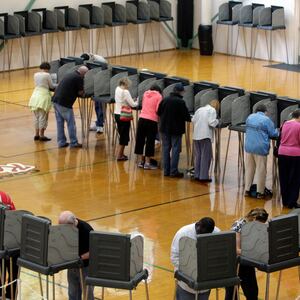Thousands of would-be voters at risk of being disenfranchised by ultra-strict registration rules. A draconian ID law that could keep Native Americans from the polls en masse. New measures targeting voting by college students. A Hispanic-majority city that moved its lone polling place out of town.
As the 2018 campaign nears its end, experts who track voter suppression say this is the worst it’s been in the modern era. In fact, making it harder to vote, especially for racial minorities, now appears to be—with the possible exception of stoking fear over a group of desperate migrants still about 700 miles from the Texas border—the single most important plank of the GOP’s strategy.
Aside from likely giving Republicans an undeserved boost in several key races, the drive to restrict voting has reached a scale that should raise serious questions about the democratic legitimacy of our elections. And alongside the extreme Republican gerrymander—currently the only reason why the party has even an outside shot at holding onto the House—it represents a massive structural obstacle to Democrats ever achieving the power their popular support deserves. In other words, Republicans can only win by rigging the game.
Georgia has grabbed many of the headlines. Secretary of State Brian Kemp reportedly put around 53,000 registrations—70 percent of them from African-Americans—on pending status because of minor discrepancies with the information on state records.
The difference could be as trivial as a misplaced hyphen or a missing middle initial. Those on pending status are supposed to still be able to vote by showing ID, and two late-breaking court rulings softening some of the rules may help. But given the likely level of confusion that’s been kicked up, how it all will play out is anyone’s guess.
Kemp also has aggressively purged Georgia’s voter rolls, raising serious concerns that eligible voters have been wrongly removed. Since 2016, he has scrapped over one in 10 names. And in the four years before that, he purged 1.5 million, twice as many as in the previous four years.
The likely chief beneficiary of these strict policies? That would be Kemp himself, the Republican locked in that super-tight race with Democrat Stacey Abrams, who’s bidding to be the nation’s first ever female African-American governor. Oh, and just for good measure, back in 2014 Kemp, on flimsy evidence, launched an aggressive investigation into a voter registration group serving mostly minority voters that Abrams had founded, significantly stymieing the group’s work.
A Kemp victory would be perhaps the clearest evidence yet that actively blocking the votes of your opponent’s supporters can make the difference. And it would offer a tempting game-plan to other potential vote-suppressors around the country.
Several Republican-controlled states, including Missouri and Iowa, have new voter ID laws in place this year. One of the strictest is North Dakota’s, which requires voters to show a residential mailing address. That could create problems for thousands of the state’s native Americans, many of whom live in reservations without mailing addresses, and who are key to Democrats’ already slim chances of holding onto a crucial Senate seat.
In New Hampshire, two new laws continue the Republican campaign to restrict voting by college students there. One requires those using same-day voter registration to show proof of address—something many students struggle to do—or risk a $5000 fine. The other changes the state’s residency rules in a way that will require out-of-state students looking to vote in New Hampshire, as is their right, to register their cars in the state or get an in-state driver’s license.
In case you’re wondering how New Hampshire turned into a hotbed of voter suppression alongside states like Georgia and Alabama, it’s worth knowing that the state’s Republicans have been trying ever since the 26th Amendment to cut back the student vote, which makes up an important piece of the Democratic base. Those efforts went into overdrive after 2016, when the GOP lost a Senate seat by just 1,017 votes, with students almost certainly making the difference.
North Carolina has nearly 20 percent fewer early voting sites than it did in 2014, thanks to a GOP-backed law—the latest measure in a decade-long assault on voting in the Tar Heel State—requiring uniform early voting hours across the state, which has reduced the flexibility counties previously enjoyed and forced many of the poorer ones to cut back on locations. Minority voters in the state use early voting at especially high rates.
But the most brazen effort to stymie voters may have happened in majority-Hispanic Dodge City, Kansas, where local election officials moved the only polling place from downtown to the edge of the city, and more than a mile from the nearest bus stop. When the ACLU sent a letter of complaint, an election administrator forwarded it to state officials with the words “LOL.”
President Trump deserves plenty of the blame. For two years, he’s been falsely stoking fear about voter fraud, including the lie that he’d have won the popular vote were it not for millions of illegal votes. His bogus voter fraud commission, which imploded earlier this year under the weight of its own mendacity, nonetheless helped establish the push to restrict voting as a key plank in the modern GOP’s agenda.
But the Supreme Court bears as much responsibility or more. The Court’s 2013 ruling in Shelby County v. Holder neutered the most effective piece of the Voting Rights Act, which had required areas with a history of racial discrimination in voting to get changes to election rules approved by the federal government in advance.
That’s smoothed the path for high-profile restrictions like Texas’ strict ID measure and Georgia’s crackdown on registration. But others, no less pernicious, have flown further under the radar: Hundreds of polling sites in areas freed from federal scrutiny by the ruling have quietly been shuttered, one study found, and voter purge rates in those same areas have skyrocketed.
Put bluntly, the central question of politics in the Trump era is how long Republicans can undermine democracy effectively enough to maintain their hold on power. Success this year likely would embolden them to push even further, perhaps by shooting for the voter suppression holy grail: a national voter ID law, and a requirement that those registering to vote show documentary proof of citizenship. If they succeed at that, we could one day look back on this cycle as a relative golden age for voting rights.







